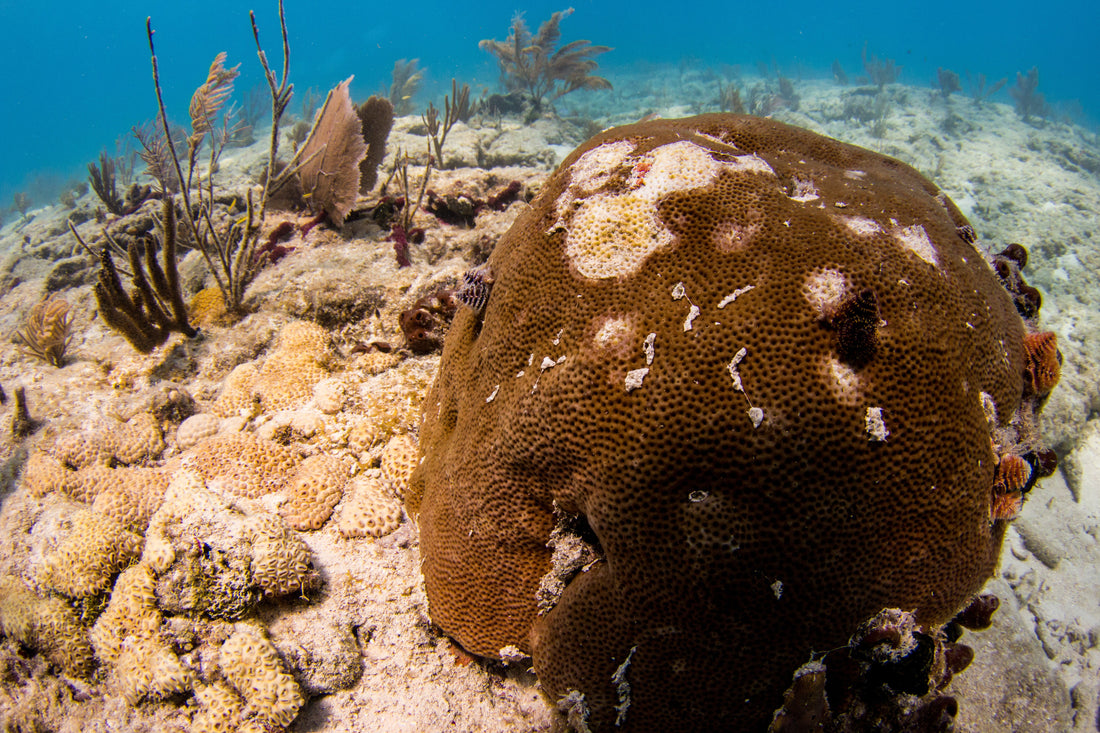
What is Stony Coral Tissue Loss Disease – and How Can You Help?
Share
However, stony coral tissue loss disease is devastating the coral reefs in and around the Sunshine State, where Enzymedica is headquartered.
This disease was first found off the coast of Virginia Key, near Miami. State and federal agencies in the Florida Keys National Marine Sanctuary and across Southeast Florida found that it is both highly contagious and extremely lethal to affected corals.
Florida’s Coral Reef was once a thriving, biodiverse ecosystem that was home to a massive variety of marine life. After decades of degradation due to pollution, bleaching events, and more, stony coral tissue loss disease is wiping out some of the last remaining corals, leaving behind a desolate, colorless reef. Some areas have lost all but 5% of its living coral cover in the last couple of decades.
The disease first appeared in 2014. Within five years, it had spread along Florida’s Keys and elsewhere in the Caribbean Sea. Not all coral species seem to be equally susceptible to stony coral tissue loss disease. Dendrogyra cylindrus (pillar coral) and Meandrine meandrites (maze coral) have quite rapidly fallen to the disease. Monstastraea cavernosa (great star coral) is a crucial reef-building coral, and it has been heavily impacted by the disease.
When coral reefs die or disappear, it has a ripple effect for marine life, which impacts the whole planet – and people.
Mote Marine Laboratory’s Restoration Project
Thankfully, there is help for the coral reefs. Mote Marine Laboratory & Aquarium is a world-class institute specializing in marine research, conservation and public outreach. Their coral reef research and restoration efforts have helped restore some areas of Florida’s Coral Reef. This massive undertaking involves creating coral reef nurseries to raise coral fragments to plant on the damaged areas of the reef. Mote has successfully raised and planted more than 100,000 fragments.
The restoration program aims to undo the devastating depletion of coral due to stony coral tissue loss disease and other natural and anthropogenic stressors. Mote uses scientific-based strategies to optimize restoration using diverse types of coral that are resilient to stony coral tissue loss disease and stressors such as rising water temperature and increasing acidity. Based out of Sarasota, Florida, Mote’s coral restoration efforts take place at their state-of-the-art Elizabeth Moore International Center for Coral Reef Research & Restoration on Summerland Key, Florida. They use land-based nurseries as well as underwater nurseries where the coral is gown on PVC “trees” before they are planted onto the reef.

Dr Michael P Crosby out plants branching coral - Credit Conor Goulding Mote Marine Laboratory
Buy A Bottle Save A Reef
Enzymedica has partnered with Mote Marine Laboratory. Every time you buy a bottle of our Aqua Biome™ omega-3 fish oils, you’re helping restore the Florida Coral Reef System. For every Aqua Biome bottle sold, $1 is donated to Mote Marine Laboratory & Aquarium to plant corals to restore Florida’s Coral Reef. To date, Enzymedica has donated more than $150,000 to Mote’s coral reef restoration efforts. This money has been used to plant hundreds of coral fragments onto a reef site in the Lower Keys, and Mote scientists continue to monitor the site and see growth from the out planted corals.
Our Aqua Biome products are the world’s first Clean Label Project Certified fish oils. Aqua Biome undergoes a unique extraction process to attain a level of purity that is unmatched among fish oils. We include “the forgotten” omega, DPA and created the world’s 1st omega blend designed for a healthy microbiome.* Learn more.

